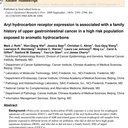Against NF-κB/thymic stromal lymphopoietin signaling pathway, catechin alleviates the inflammation in allergic rhinitis.
Ключавыя словы
Рэферат
BACKGROUND
The prevalence of allergic rhinitis has risen sharply. Previous work has demonstrated the anti-inflammatory effect of catechin, including in models of allergic disease. However, the molecular mechanisms underlying this therapeutic effect remain unclear. Thymic stromal lymphopoietin(TSLP), as a molecule from epithelial cell, has been identified that plays a significant role in the development of allergic disease, and the production of TSLP is related to activation of the NF-κB signaling pathway. For that, we try to research the treatment of catechin for allergic rhinitis and found out possible mechanism under this effect, which was based on TSLP factor.
METHODS
Here, the anti-inflammatory effects of catechin were studied in an ovalbumin-induced allergic rhinitis murine model and a vitro experiments using poly(I:C)-stimulated human nasal epithelial cells(HNEpCs). The pharmacological effects of catechin in allergic rhinitis mice were assessed by observing the allergic symptoms, performing hematoxylin and eosin staining and Giemsa staining of the nasal tissues. Additionally, the TSLP expression in epithelial cells was tested by enzyme-linked immunosorbent assays, immunohistochemistry, and western blots. The serum levels of interleukin-5, interleukin-13, and ovalbumin-specific immunoglobulin-E were detected by enzyme-linked immunosorbent assays, and the balance between T helper type 1 and T helper type 2 cells was assessed by flow cytometry. The expression levels of phospho-NF-κBp65, IκBα, and NF-κBp65 proteins were further investigated by western blots or immunofluorescence.
RESULTS
Our results reveal that catechin, in doses of 75, 150, or 300 mg/kg, remitted the allergic symptoms in mice with allergic rhinitis, like sneezing and nasal rubbing. Catechin could reduce the levels of interleukin-5, interleukin-13, and ovalbumin-specific immunoglobulin-E in the serum and restored the T helper type 2/T helper type 1 cell balance and also had anti-thymic stromal lymphopoietin effects. Moreover, as an upstream regulator of TSLP, the NF-κB signal pathway was also suppressed after catechin treatment, which was demonstrated by the observed decrease in phospho-NF-κBp65 and NF-κBp65 levels and the reduction of IκBα degradation and NF-κBp65 nuclear translocation.
CONCLUSIONS
Catechin effectively reduced the inflammation in allergic rhinitis. The underlying mechanism is that catechin inhibited the expression of TSLP in epithelial cells by influencing NF-κB/TSLP pathway.




